- Home
- V. S. Naipaul
The Return of Eva Perón, With the Killings in Trinidad Page 2
The Return of Eva Perón, With the Killings in Trinidad Read online
Page 2
But not Steve Yeates, whose death by drowning Malik had reported to the press just a week before. Steve’s denture had no gold, his father said when he went with the police to the Port of Spain mortuary. Steve’s hair was different; there was no need for his father to look for the large scar on the back, the relic of a fight Steve had had in England. Not Steve Yeates, an anonymous woman caller told The Bomb the next day: the body was that of another “brother” in the “organization.” “The man died last week Monday night, and the whole thing was accidental. They did not go to kill him. Just beat him up . . . He died foolishly as he won’t abide by the rules of the organization.”
And that was not far wrong. The body was identified the day after as that of a twenty-five-year-old Port of Spain man, Joseph Skerritt, a man once charged with rape (like Steve Yeates himself) but otherwise quite undistingushed: the failure of his respectable lower-middle-class family, one of thousands of the city’s half-educated young men, unemployed and superfluous, drifting through their twenties, idling in streets scrawled with empty slogans: BLACK IS IN, BASIC BLACK. Joe Skerritt had last been seen alive a fortnight before on February 7th. On that day Malik, with his retinue, had called at the Skerritt house in Port of Spain and taken Joe away to Arima.
Malik’s house was the only one on the western side of the approach lane. To the north of the house, beyond a boundary line of young coconut trees and the high wire-mesh fence, there was a piece of wasteland, ending after two hundred feet or so in a narrow tree-hung ravine, its water slow and shallow and not fresh. On the southern bank of this ravine, two days after the discovery of the body of Joe Skerritt, a second grave was found. This grave was shallower, about four feet, and the smell was soon high. A blue dress with a flowered pattern, red panties, a twisted, decomposing body: Gale Benson.
She had been stabbed to death on January 2nd. And here, on the ravine bank, she had lain for more than seven weeks. And no one had missed her, not even the two English people who were visiting the commune at the time. But they no doubt had other things on their minds. Simmonds, the woman, well-nourished, with big, widely spaced top teeth, told The Bomb that during her six weeks at the commune she had had “total involvement” with Steve Yeates: Muhammed Akbar, Supreme Captain of the Fruit of Islam, who on December 31st (before the public holiday on January 1st) had gone to Cooblal’s Hardware and bought a six-inch corner file.
And Jamal—Benson’s master—what had Hakim Jamal done? Simmonds remembered that one morning in January, after they had all dined together the previous evening, Jamal had said that he and Benson had had a quarrel and Benson had gone away. And that was that. Eighteen days later Jamal left the Malik commune to return to the United States. He didn’t leave alone. He left with the “co-worker” he had summoned down from the United States in mid-December, a man who had remained in the background, and of whom little was remembered; an American Negro known in the commune by the African-sounding name Kidhogo or Kidogo.
In Trinidad now there were many rumors of fresh finds at the commune; one rumor was that a tinful of mixed penises had been found. But the ground had given up its dead. Six men were charged with the two murders. Five were Trinidadian; one was American. This wasn’t Jamal, but his co-worker Kidogo. Kidogo was one of the five charged with the murder of Benson. Kidogo was in hiding in the United States. Jamal gave interviews, and now he was as sober and anxious to survive as everybody else. He spoke of “the atmosphere of violence” at the commune; he said he was lucky to be alive; he said he would like to see Malik and ask him a few questions about Benson.
So, in sobriety and self-absolution, the Malik commune ended. The ground had been dug up, the house burned out. All that remained were the two Malik dogs, bewildered, never barking or whining, restless, scampering about the grounds and the road, excited by the sound of every stopping car. But no car brought the people they were looking for.
In Guyana, Malik was on the run. McDavidson, who had traveled with the Malik family from Trinidad and had, as uncle of the Junior Minister for Youth Affairs, arranged their reception in Guyana, McDavidson shaved off Malik’s Black Power beard and trimmed his hair. Someone else went to get new clothes and a new pair of shoes; and Malik, in his new outfit, had booked in under another name—perhaps “Mr. T. Thompson”—at another hotel. Michael de Freitas, Michael X, Michael Abdul Malik, and now Mr. Thompson, Mr. Lindsay, Joseph, George. So many names, so many personalities, so many ways of presenting himself to people: that was his great talent, but now, at the end, he was close to breakdown.
He stayed for three days in the hotel, the curtains always closed in his room. He told the Indian chambermaid that he had malaria and couldn’t stand the sunlight. He ordered nothing from the bar or the kitchens. The chambermaid went out to buy him sandwiches and soft drinks, paper and two ballpoint pens. He had important messages for various people. He was only a “middleman,” he had told McDavidson; the really important man, the man with the “massive plan,” was coming down soon from the United States to meet him in Guyana. The chambermaid, taking in a flask of iced water, for which he had asked, saw him “writing letters.” But he wasn’t happy using ballpoint pen; he would have preferred a tape recorder. In the darkened hotel room he became obsessed with the need for a tape recorder, and once he nearly telephoned his wife to bring him one. “I wanted,” he said later, “to record on tape all the things that had happened to me. I wanted to get it on record.” Words were important to him; he had lived by words. Words could give shape to an event, and words were never more important than they were now.
In England there were people who had told him that he was a writer, even a poet; and often, in a marijuana haze (“I am high I love it”), he had tried to be a writer, writing out the marijuana mood in a page or two and coming to a halt. In these writings fact and fiction sometimes flowed together. With words he remade his past; words also gave him a pattern for the future. And, bizarrely, he had once written of an adventure that was like the one he was having in Guyana.
The narrator, who may be Malik himself, is on the run. With only twenty pounds in his pocket, he is taken in by someone called Frank and told he can stay for six months. That night the narrator sleeps and has no nightmares. Then the door opens. “My Friend My saviour Frank, with a [indistinct] breakfast and a Newspaper, all smiles. You in the paper today he says, and I panic again, they found me. I think [indistinct] more. Let me see! I say there was I not too bad a picture and a short story. One of Trinidad’s more famous sons returns home to finish writing his novel. In an Exclusive Interview at—and it goes on and on, I smile relieved the Journalists here have an Imagination like anywhere else—” Here the fragment ends.
But in Guyana the nightmare did not break. The reports in the Guyana newspapers, which he was reading in the hotel, were getting worse. And two days after the discovery of the body of Gale Benson he left the hotel, took a taxi south to the bauxite town of Mackenzie (now called Linden, after the first name of Mr. Burnham, the Guyana Prime Minister), and then, in his new long-sleeved blue shirt and red-checked short trousers, with an airline bag containing some of his hotel writings (some he had left behind in the hotel room), some Guyana ten-dollar notes, biscuits, milk, sardines and other tinned food, and with a piece of cutlass, he headed for the interior, along the southwest trail.
Two hundred miles away, beyond the forest and the brown savanna land with the giant anthills, lay the Brazilian border. It seemed that he was making for this, but later he said: “I knew of a person in the interior who was a good and wise person to counsel with. I thought I would find this person. . . . I have always been to counsel with people who can see things. You have a man here in Trinidad called Harribance. I go to him. I like these people. I thought I would go to this person and counsel with him and find out what is happening because it was not something I could reason out.”
He was on the trail for three days. He was now bare-footed: the new shoes that had been bought for him in the capital didn’t fit
or had become too painful. About four or five in the afternoon of the third day he saw two Land-Rovers. Government Land-Rovers: a survey team: a camp. He waited for two or three hours. About half-past seven he went to the men in the camp. He said, “Good night, gentlemen,” and introduced himself as a journalist. They gave him a cup of coffee. He said—too vaguely—that he wanted to go “down the trail”; and after about half an hour he and a man called Caesar and another man left the camp in a Land-Rover.
Malik asked Caesar about the road to Brazil, and about his religion. Caesar, a handsome man, big and very black, said he belonged to a local Africanist group which was something like a Black Power group. Malik—the X again—said that police all over the world were looking for him. But then he must have had an intimation of betrayal. And his mind worked fast. He said there were two messages he wanted Caesar to take back to Georgetown, the capital. One was for Mrs. Malik: Caesar was to tell her that he, Malik, was safe. The other message was for Caesar’s Black Power leader: Caesar was to tell him that there was a police informer in the group.
After five or six miles Malik, who had become restless, was set down at a place called Bishop’s Camp. Bishop was a small elderly Negro, a solitary in his bush “farm”; and his “camp” was two thatched shelters, one with no walls. He gave Malik some stew-and-rice and “sweet broom” herb tea. Thousands of police were after him, Malik said; and Bishop said (the real-life adventure, now in an unexpected forest setting, echoing that scrap of Malik’s man-on-the-run fiction) that Malik could stay in the camp for the rest of the year.
Malik was tired, and during this last night of freedom his talk was disordered. He asked repeatedly about Brazil, and his safety in the camp; he said he had no faith in Caesar. He remembered the Trinidad commune, and that fantasy of “agriculture” became fact. He said he would teach Bishop “how to grow greens.”
He said he wanted a job: he could “plant.” Bishop should plant mustard and celery in boxes and after three weeks plant them out eighteen inches apart. He asked Bishop if the river was far. Bishop said it wasn’t far; but Malik said he would show Bishop how to get water from the river without walking to the river. He remembered England, and especially Rachman, the slum landlord for whom he had worked in the early days in London; and Bishop must have been puzzled. To Bishop it seemed that Malik was saying that he had owned a big boardinghouse in London, with a big garden, that he had kept a big dog and a revolver, and that when tenants couldn’t pay he had put them out, but that he had always been nice to Guyanese.
Bishop made up a low “cot” for Malik in the open shelter. Malik, lying down, seemed to groan. He said his feet were cold; Bishop gave him a sack for his feet. Malik presently fell asleep. But Bishop didn’t sleep: he was frightened of Malik’s “piece of cutlass.” All night he watched Malik.
At about half-past five, when it was still dark, the camp dogs barked, and Bishop saw the police; Caesar was with them. They surrounded the shelter and waited. It quickly became light, and “the form of a fair-skin man lying on the lower or western cot” became distinct to the police superintendent. At five to six they began to close in. Bishop, still watchful, pointed to Malik’s airline bag and cutlass. At six, daybreak, the superintendent tapped Malik and awakened him.
When he saw the police he was, as he said later, relieved. His feet were hurting; he doubted whether he could walk. He was taken to Georgetown; the next day he was declared an undesirable immigrant and flown back to Trinidad.
The discovery of the body of Gale Benson had been the sensation; but the first inquiry was about the killing of Joseph Skerritt, who had been buried below the lettuce patch, and it was for the murder of Skerritt that Malik and three of his commune were tried four months later. When the grave was discovered, an anonymous woman caller had told The Bomb that the body, then not yet identified, was that of a “brother” who had failed to “abide by the rules of the organization.” And Skerritt’s killing was indeed in the nature of an execution.
Malik was uneducated, but people in England had told him that he was a writer; and he did his best to write. There were also people who had told him—ponce, con man—that he was a leader (though only of Negroes). So he had read books on leadership; and once, borrowing a good deal from what he had read, he had even written a paper on the subject. “I have no need to play an ego game,” he wrote, explaining his position, “for I am the Best Known Black man in this entire [white western world deleted] country.” Leaders were workers, doers, finders of tools, “be it money, hammers or saws”: the “masses” came of their own accord to such leaders. But it was not always pleasant to be a leader. “Leaders are feared even by those closest to him . . . and others will envy him . . . here one needs an Iron Hand for one may be tempted to placate the doubter with a gift, and the only real gift one can give is silence.” Borrowed words, almost certainly; but Malik was made by words. And Joe Skerritt was a doubter.
The previous year, when Skerritt had been charged with rape, he had gone to Malik for help, and Malik had talked the girl out of making trouble for Skerritt. But then Skerritt had become uneasy with Malik; he began to hide from him; and to Mrs. Skerritt it even seemed that her son was being ungrateful. At last, on February 7th, Malik came with some of his commune to the Skerritt house in Port of Spain; and they took away Joe with them to Arima “for a few days.”
Skerritt loafed about the garden that day, doing the odd jobs. In the evening he and three of the commune got into a hired car and went for a drive. When they were on the Arima-Port of Spain highway, Abbott, the driver, said they were going to raid a police station for arms. Skerritt said he wanted none of that; and Abbott immediately drove back to Christina Gardens. Malik said, “Joe, boy, you say you ready for work, and now that I’ve sent you to work, you refuse to go?” He looked at Skerritt and shook his head, and said to the man escorting Skerritt to his sleeping quarters that he should give Joe a Bible or something to read.
A sudden decision, it would seem; but—from the evidence given at the trial—what followed was well planned. In the morning Steve Yeates drove Mrs. Malik and her children to Port of Spain. That wasn’t unusual. Malik announced that the commune was going to dig a “soakaway” that day. That wasn’t unexpected. The ground flooded easily: a soakaway helped drainage, and Malik had taken advice from a qualified man about soakaways. A pit had to be dug down to where the soil changed; and then it was to be filled in with a bottom layer of stones and a top layer of earth.
So all morning—Malik from time to time interrupting his “writing” in the “study” to superintend—some men dug and two others brought jeeploads of stones to the house. Joe Skerritt, in his “old clothes,” jeans and a green jersey, helped with a wheelbarrow, taking the stones from where the jeep dropped them to the far northwestern corner of the garden. At about one o’clock the pit was deep enough. Malik told the two men in the jeep to go and “cool off’ at a farm they all knew and then to bring a load of manure.
When they left, there remained in the garden Malik, three men, and Joe Skerritt. One of the three men walked away from the hole. Malik, with his revolver in a shoulder holster, and with a cutlass in his hand, went down into the pit and said to Abbott, “I am ready. Bring him.” Abbott locked his arm around Skerritt’s neck and jumped with him into the pit. Malik, using his left hand to hold Skerritt by his long Afro hair, chopped him on the neck and then, still with his left hand, threw him aside. The gesture, of “contempt,” appalled Abbott. Skerritt cried out, “Oh, God! Oh, God!” and began stumbling about the pit. Malik, now out of the pit, lifted a large soakaway stone with both hands and brought it down on Skerritt’s head, and Skerritt, close to death, cried out like a child, “I go tell! I go tell!” Malik hurled three or four more stones at Skerritt, and then Skerritt was quiet. Then the four men—the fourth man called back to help—began to fill in the pit, the stones below, the earth on top.
When the two men returned with the jeepload of manure from the farm, they saw that the
stones had disappeared, the soakaway was half filled in; they helped finish the filling in. And when presently the Malik family returned from Port of Spain, the commune was the commune again. As for Skerritt, “the strange young man” who had turned up the day before, he had just gone away again. The foolish boy had gone to Canada or the United States, but he was going to find things hard “outside”: that was what Mrs. Skerritt was told. And that, at the trial, was Malik’s story: that Joe Skerritt had just disappeared.
Abbott, who had jumped with Skerritt into the pit, was sentenced to twenty years. Malik was condemned to hang. Some people stood by him. One of them was Rawle Maximin, a boyhood friend, the garage owner whose cars Malik had often hired. Maximin visited Malik at the Royal Jail in Port of Spain. One day, many months later, when he was waiting for the verdict on his appeal, Malik said to Maximin, “You were with me that day when I went to see Harribance. Can you remember what Harribance said?” “He hadn’t forgotten,” Maximin says. “He just wanted to hear me say it. So I said to him, ‘Harribance told you that you would leave Trinidad and go to Jamaica, and then you will be the ruler of the Negroes in the United States.’ And he said, ‘Good, good.’ And began to pace up and down that little cell.”
To be the ruler of Negroes: so that, at the end, for Malik and his well-wishers abroad (mainly white, and they continued to send him money), Negroes existed only that Malik might be their leader. Malik saw himself as a man who had always risen: a semi-educated Port of Spain idler, one of thousands; then a seaman; then a Notting Hill pimp and gangster; then the X of London; then, at thirty-seven, “the Best Known Black man of this entire white western world.” It was as a London success that he had come back to Trinidad in January 1971. “I’m not here to make my way,” he told the Trinidad Express. “I’ve made that already,” But he believed he could “help.” “I’m not interested in elections and stuff like that. The only politics I ever understood is the politics of revolution—the politics of change, the politics of a completely new system.”

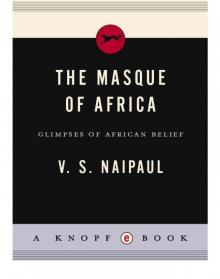 The Masque of Africa: Glimpses of African Belief
The Masque of Africa: Glimpses of African Belief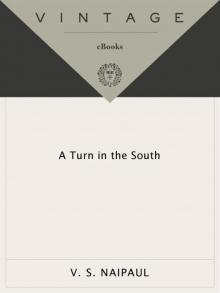 A Turn in the South
A Turn in the South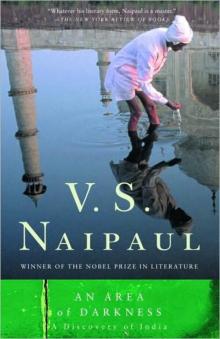 An Area of Darkness
An Area of Darkness Literary Occasions: Essays
Literary Occasions: Essays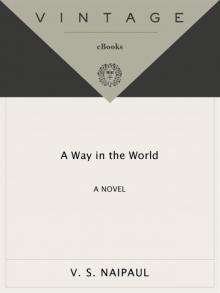 A Way in the World
A Way in the World Among the Believers: An Islamic Journey
Among the Believers: An Islamic Journey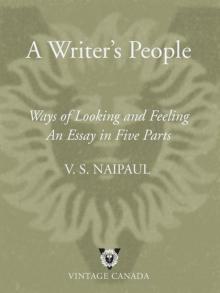 A Writer's People: Ways of Looking and Feeling
A Writer's People: Ways of Looking and Feeling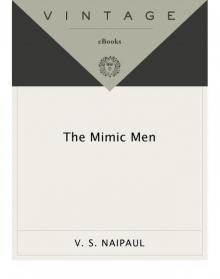 The Mimic Men: A Novel
The Mimic Men: A Novel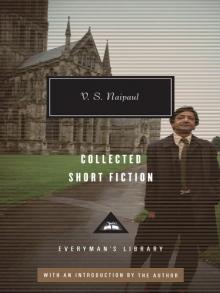 Collected Short Fiction
Collected Short Fiction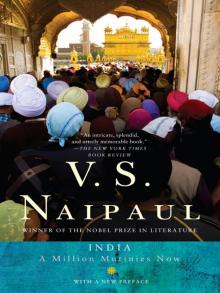 India: A Million Mutinies Now
India: A Million Mutinies Now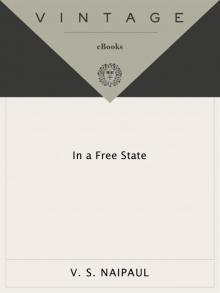 In a Free State
In a Free State Half a Life
Half a Life Beyond Belief: Islamic Excursions Among the Converted Peoples
Beyond Belief: Islamic Excursions Among the Converted Peoples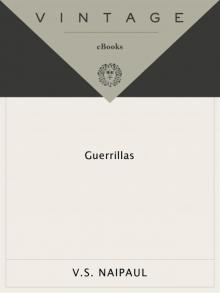 Guerrillas
Guerrillas A House for Mr. Biswas
A House for Mr. Biswas The Writer and the World: Essays
The Writer and the World: Essays Magic Seeds
Magic Seeds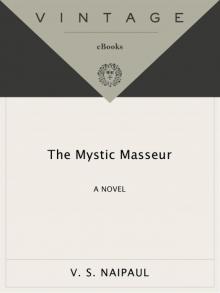 The Mystic Masseur
The Mystic Masseur Miguel Street
Miguel Street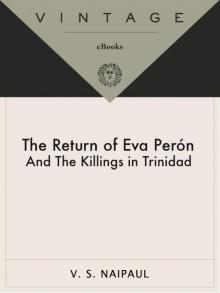 The Return of Eva Perón, With the Killings in Trinidad
The Return of Eva Perón, With the Killings in Trinidad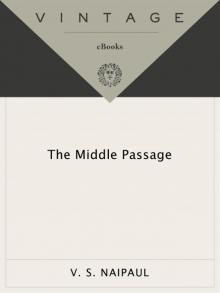 The Middle Passage
The Middle Passage A Bend in the River
A Bend in the River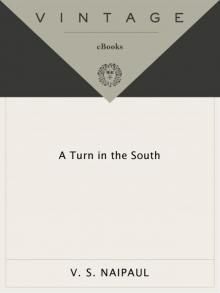 A Turn in the South (Vintage International)
A Turn in the South (Vintage International) Among the Believers
Among the Believers Literary Occasions
Literary Occasions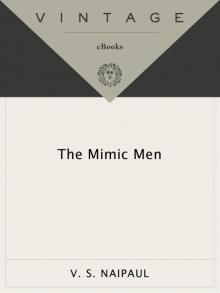 The Mimic Men
The Mimic Men The Writer and the World
The Writer and the World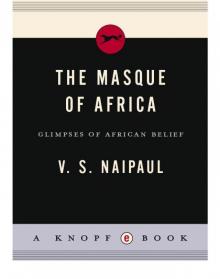 The Masque of Africa
The Masque of Africa